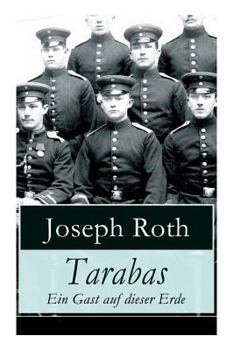Tarabas - Ein Gast auf dieser Erde: Rastloses Leben von Oberst Nikolaus Tarabas (Historischer Roman - Erster Weltkrieg)
Select Format
Select Condition 
Book Overview
It is Roth's special gift that, in Tarabas's fulfillment of his tragic destiny, the larger movements of history find their perfect expression in the fate of one man. This description may be from another edition of this product.
Format:Paperback
Language:English
ISBN:8026860632
ISBN13:9788026860631
Release Date:November 2017
Publisher:E-Artnow
Length:108 Pages
Weight:0.34 lbs.
Dimensions:0.2" x 6.0" x 9.0"
Customer Reviews
1 rating
Another Holy Sinner
Published by Thriftbooks.com User , 15 years ago
Nicholas Tarabas... the monk Hildebrandt, Siddhartha, Parzifal, Goethe's particular Faust, and a host of lesser examples would make one suspect that Germans and German writers have always been obsessed with the Mitteleuropean "Three Rs": Repentance, Renunciation, and Redemption. Of course, book-worthy repentance has to be prefaced by vivid sins; Tarabas's sins are chiefly of violence - beginning with a simple fist fight but crescendoing to a horrific pogrom - and drunkenness. His renunciation, however, is total, an excruciating commitment to suffering and squalor described in achingly credible detail. And his redemption is ambiguously impersonal, posthumous, useless to anyone except as an icon. Truly, everything about Tarabas - the character and the book - is iconic and archetypal; one might almost suspect that Joseph Roth had been studying Karl Jung. Tarabas is a young Russian of good and wealthy family, a university student who is expelled for semi-serious anti-Tsarist activity. He spends some aimless years in America, then returns to Russa at the beginning of World War 1 to become a ruthlessly effective 'front' officer, a veritable devil of a fighter. The Russian Revolution complicates his story, deprives him of his self-satisfaction as a fighter. He becomes an officer without a war in a fragment country which may be Belarus. Eventually, bad gets worse, he presides over a pogrom without being sober enough to grasp the situation, he commits an act of violence against a harmless Jewish idiot that somehow awakens him to his own degradation. Joseph Roth wasn't in fact German. He was a Jew from the eastern fringe of the Austro-Hungarian Empire. His descriptions of Tarabas's anti-semitism, and the anti-semitism of Tarabas's world, must have been monstrously painful to write. But Tarabas is a Christian of sorts, and Roth frames his story of 'redemption' in essentially Christian mystical terms. There's a huge ambivalence in this tale; the author wears a three-cornered hat of Judaism, folklorish mysticism, and outright skepticism. I reckon that it's the intellectual tension of Roth's ambiguity that makes this book worth reading... that, and the stunningly beautiful prose, sentence after sentence. Ordinarily, this is a genre of fiction that doesn't compel my interest, but how could I not be compelled by writing like this: "In the out-house where the miracle had occurred two candles had now been lighted. They were stuck upon a log of wood and lit the Virgin's face with their uncertain flame.... The candles, continually renewed -- no one could tell were they came from; it was as though every peasant had brought candles with him to Koropta -- shed shadow rather than light. A solemn darkness reigned within the room, a darkness of which the candles were the shining core...." Into this luminous darkness, in a few moments of prose, the Jews of Koropta will be dragged pathetically and forced to worship a painting of the Mother of Jesus while being spit up





